

JRuby 1.5.0 Released: The Best Alternative Ruby Implementation Gets Even Better. Following on five months after the release of the popular JRuby 1.4, the JRuby team have delivered JRuby 1.5!
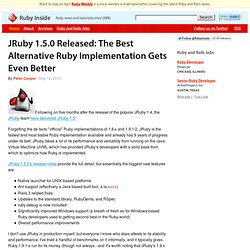
Forgetting the de facto "official" Ruby implementations of 1.8.x and 1.9.1/2, JRuby is the fastest and most stable Ruby implementation available and already has 9 years of progress under its belt. JRuby takes a lot of its performance and versatility from running on the Java Virtual Machine (JVM), which has provided JRuby's developers with a solid base from which to optimize how Ruby is implemented. JRuby 1.5.0's release notes provide the full detail, but essentially the biggest new features are: Native launcher for UNIX-based platformsAnt support (effectively a Java based built tool, a la make)Rails 3 related fixesUpdates to the standard library, RubyGems, and RSpecruby-debug is now includedSignificantly improved Windows support (a breath of fresh air for Windows-based Ruby developers used to getting second best in the Ruby world)Overall performance improvements.
PeepCode Screencasts. ▶ We’ve been acquired by Pluralsight!
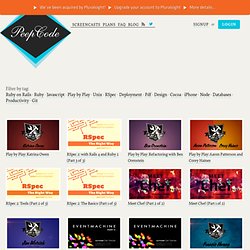
▶ Upgrade your account to Pluralsight ▶ More details… Filter by tag: Why’s (poignant) guide to ruby. Read This Paragraph At my local Barnes and Noble, there is a huge wall of Java books just waiting to tip over and crush me one day.
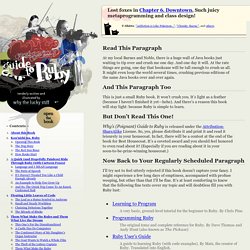
And one day it will. At the rate things are going, one day that bookcase will be tall enough to crush us all. It might even loop the world several times, crushing previous editions of the same Java books over and over again. 16: Interesting Ruby Hackers. Originally published as part of the Practicing Ruby newsletter on January 3, 2011.
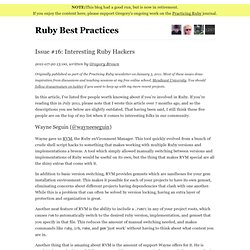
Most of these issues draw inspiration from discussions and teaching sessions at my free online school, Mendicant University. You should follow @seacreature on twitter if you want to keep up with my more recent projects. In this article, I’ve listed five people worth knowing about if you’re involved in Ruby. If you’re reading this in July 2011, please note that I wrote this article over 7 months ago, and so the descriptions you see below are slightly outdated. That having been said, I still think these five people are on the top of my list when it comes to interesting folks in our community. Wayne Seguin (@wayneeseguin) Wayne gave us RVM, the Ruby enVironment Manager. In addition to basic version switching, RVM provides gemsets which are sandboxes for your gem installation environment. Another thing that is amazing about RVM is the amount of support Wayne offers for it. 17 Videos Covering Basic Ruby Techiques.
By Peter Cooper / April 15, 2009 Tekniqal.com is a site offering a series of 17 Basic Ruby tutorials in screencast form.
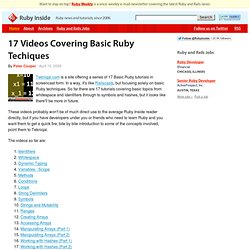
In a way, it's like Railscasts, but focusing solely on basic Ruby techniques. So far there are 17 tutorials covering basic topics from whitespace and identifiers through to symbols and hashes, but it looks like there'll be more in future. These videos probably won't be of much direct use to the average Ruby Inside reader directly, but if you have developers under you or friends who need to learn Ruby and you want them to get a quick fire, bite by bite introduction to some of the concepts involved, point them to Tekniqal. The videos so far are: 1. 21 Ruby Tricks You Should Be Using In Your Own Code. Writing for Ruby Inside, I get to see a lot of Ruby code.
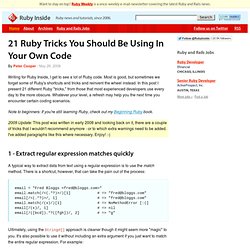
Most is good, but sometimes we forget some of Ruby's shortcuts and tricks and reinvent the wheel instead. In this post I present 21 different Ruby "tricks," from those that most experienced developers use every day to the more obscure. Whatever your level, a refresh may help you the next time you encounter certain coding scenarios.
Ruby Trick Shots: A Video of 24 Ruby Tips and Tricks. Top 5 free tutorials for beginning Ruby on Rails developers. Top 5 free tutorials for beginning Ruby on Rails developers Just getting into developing with Rails?
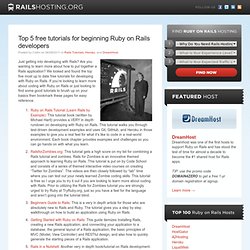
Are you wanting to learn more about how to put together a Rails application? Your community gem host. Ruby Example Code. Ruby 1.9.2 Standard Library Documentation. Learn Ruby with the Neo Ruby Koans. Ruby Quiz. Blog — All about Ruby programming. The Wonderful Tech Wizards of Oz Photo by David Jackmanson / Flickr The Information and Communication Technology sector is the fifth highest paying career group in Australia, with entry salaries starting at $88,000 and median salaries of $100,000.
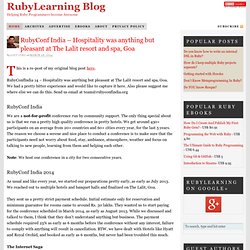
This ranking is both because of, and contributes to, Australia’s growing IT leadership. Over 50 software companies are listed on the Australian Stock Exchange. The growth of technology centers created by governmental planners and business networks, such as the Bentley Technology Park in Western Australia (adjacent to Curtin University of Technology), the Digital Harbour at Docklands in Melbourne, and the Macquarie Park in Sydney (including the Research Park and Macquarie University), combined with respected universities and the roll-out of the National Broadband Network, all demonstrate the IT successes of the Aussies!
Ruby Inside: The Ruby Blog. Ruby Rogues — Rubyist.where(:rogue => true).limit(5).all.talk(:about => Topics.where(:awesome => true)) What is ruby? Ruby Best Practices- Blog. Library. Ruby Patterns from GitHub's Codebase. The Ruby Toolbox - Know your options! Rubular: a Ruby regular expression editor and tester. Fun with Ruby Block Parameters. I always forget what kinds of crazy things you can do with Ruby's blocks and their parameters, so here's a little write-up on them.
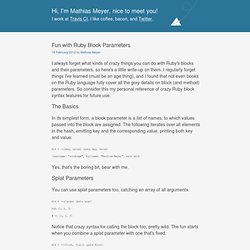
I regularly forget things I've learned (must be an age thing), and I found that not even books on the Ruby language fully cover all the gory details on block (and method) parameters. So consider this my personal reference of crazy Ruby block syntax features for future use. The Basics In its simplest form, a block parameter is a list of names, to which values passed into the block are assigned. The following iterates over all elements in the hash, emitting key and the corresponding value, printing both key and value. Yes, that's the boring bit, bear with me. Splat Parameters You can use splat parameters too, catching an array of all arguments. blk = ->(*args) {puts args} blk.(1, 2, 3) # => [1, 2, 3] Notice that crazy syntax for calling the block too, pretty wild. Blk = ->(first, *tail) {puts first} blk.(1, 2, 3) # => 1.
Advanced Ruby Arrays. From Techotopia Purchase and download the PDF and ePub versions of this Ruby eBook for only $8.99 In the Understanding Ruby Arrays we looked at the basics of arrays in Ruby.
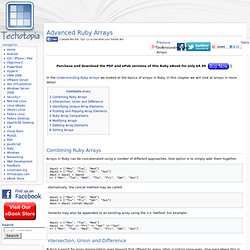
In this chapter we will look at arrays in more detail. [edit] Combining Ruby Arrays Arrays in Ruby can be concatenated using a number of different approaches. Days1 = ["Mon", "Tue", "Wed"] days2 = ["Thu", "Fri", "Sat", "Sun"] days = days1 + days2 => ["Mon", "Tue", "Wed", "Thu", "Fri", "Sat", "Sun"] Alternatively, the concat method may be called: #48 Console Tricks. Spec Tutorial: Elegant Spec-Style Testing That Comes With Ruby. Despite RSpec's awesomeness, Test::Unit remains the most popular Ruby testing tool out there outside of Rails apps.
I've recently been code walking through a lot of Ruby libraries for my Ruby Reloaded course and the typical arrangement is Test::Unit, sometimes coupled with Shoulda or Contest for some extra syntactic sweetness. Part of the reason for Test::Unit's enduring popularity is its presence in the Ruby standard library but, also, its general 'lightness' and speed. When you're writing a large app, using a powerful full-featured system like RSpec has significant benefits (particularly stakeholder involvement in writing the specs). But when you're working on a library that might spread far and wide and is aimed solely at developers, the pros of Test::Unit shine through.
Enter MiniTest Note: Ruby 1.8 users can run gem install minitest to get MiniTest too but it's not part of the standard library there. What Does MiniTest::Spec Look Like? Nothing too unusual there, I hope.